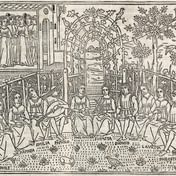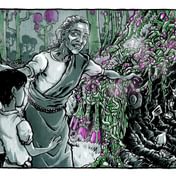
As anthropologists we often tell stories in our work to introduce a setting, to illustrate a point, to “try to grasp the fragments of the real world” (Fassin 2014, 41), or to give readers a sense of what it feels to live a life in a particular kind of way. Often, our stories take the form of ethnographic anecdotes and aim to capture the truth with fidelity (Byler and Iversen 2012; Jackson 2017, 46, 48). Decameron Relived is inspired by Giovanni Boccaccio’s classic collection of stories, set during the outbreak of the Black Death. The framing of the narrative rests on the idea that ten people in isolation tell stories to each other, over the course of ten days, to pass the time. Today, as the news that surrounds us is so often distressing and bleak, the time seems ripe to offer stories as a source of entertainment and solace, but also to provoke a different kind of existential reflection. In March 2020 I invited nine anthropologists to join me in writing, so we could share stories inspired by our ethnographic fieldwork. They were written in April 2020, a time when many places around the world were in strict lockdown and people were advised not to leave their homes. As I hope readers will find out for themselves, stories proved once again to be good and reliable companions.
Acknowledgments
This work was supported by an AHRC Leadership Fellowship.
Editors' Note
We would like to thank Steven Gonzales for his invaluable contributions as editorial assistant for Fictions.
References
Byler, Darren, and Shannon Dugan Iverson. 2012. “Literature, Writing, and Anthropology.” Curated Collection, Cultural Anthropology.
Fassin, Didier. 2014. “True Life, Real Lives: Revisiting the Boundaries between Ethnography and Fiction.” American Ethnologist 41, no. 1: 40–55.
Jackson, Michael. 2017. “Writing with Care.” In Crumpled Paper Boat: Experiments in Ethnography, edited by Anand Pandian and Stuart McLean, 45–47. Durham, N.C.: Duke University Press.
Posts in This Series

Prologue
To take pity on people in distress is a human quality which every man and woman should possess, but it is especially requisite in those who have once needed com... More

Waiting
It’s an ordinary morning. I wake up lying on my back. I can feel my joints aching, they always ache in the morning. Eyes still closed, I enjoy the smell of newl... More

A Journey to Kandahar
Day was breaking and Safia and I were clearing away the plates. We’d put out all your favorite things—not just our everyday bread and white cheese, but the litt... More

The Homecoming
They always came for him in packs. Small groups, maybe three or four at a time, never just one. This time, though, there must be at least ten of them. Maybe mor... More

Bored Bird
Piri was feeling sad and lonely. He was tired of always eating the same thing, and longed for the time before the hiders abandoned their fields and scattered in... More

Friends
On the evening of the fire, Koichi went to attend a community meeting a few blocks away from the old tobacco shop. “It was consumed in minutes,” the neighbors c... More

Isabella; or, The Achiote Bush
They could not, sure, beneath the same roof sleep But to each other dream, and nightly weep. —John Keats It was a Monday, at five minutes after noon, when the ... More

The Ikebukuro Jianghu
Akiko was studying Chinese and had asked her friends to explain the Jianghu to her, but they admitted it was hard to grasp. At first, she thought it meant the C... More

No Story Is My Story
I come from the lands of the devil, of dragons and princesses, and of 1001 Nights and the Brothers Grimm. My Tete and my Oma nursed me on stories. They taught m... More

A Stranger to the Weave
Suruli was playing down by the river when he found it. Something long and black, poking out of the wet sand. It could have come down in the storm; the river had... More

Progress Report
The world celebrated the day the USA-ITM powered robot produced toilet paper, synthetic pork, and a clone of itself simultaneously.1 Surely, they said, the Age ... More